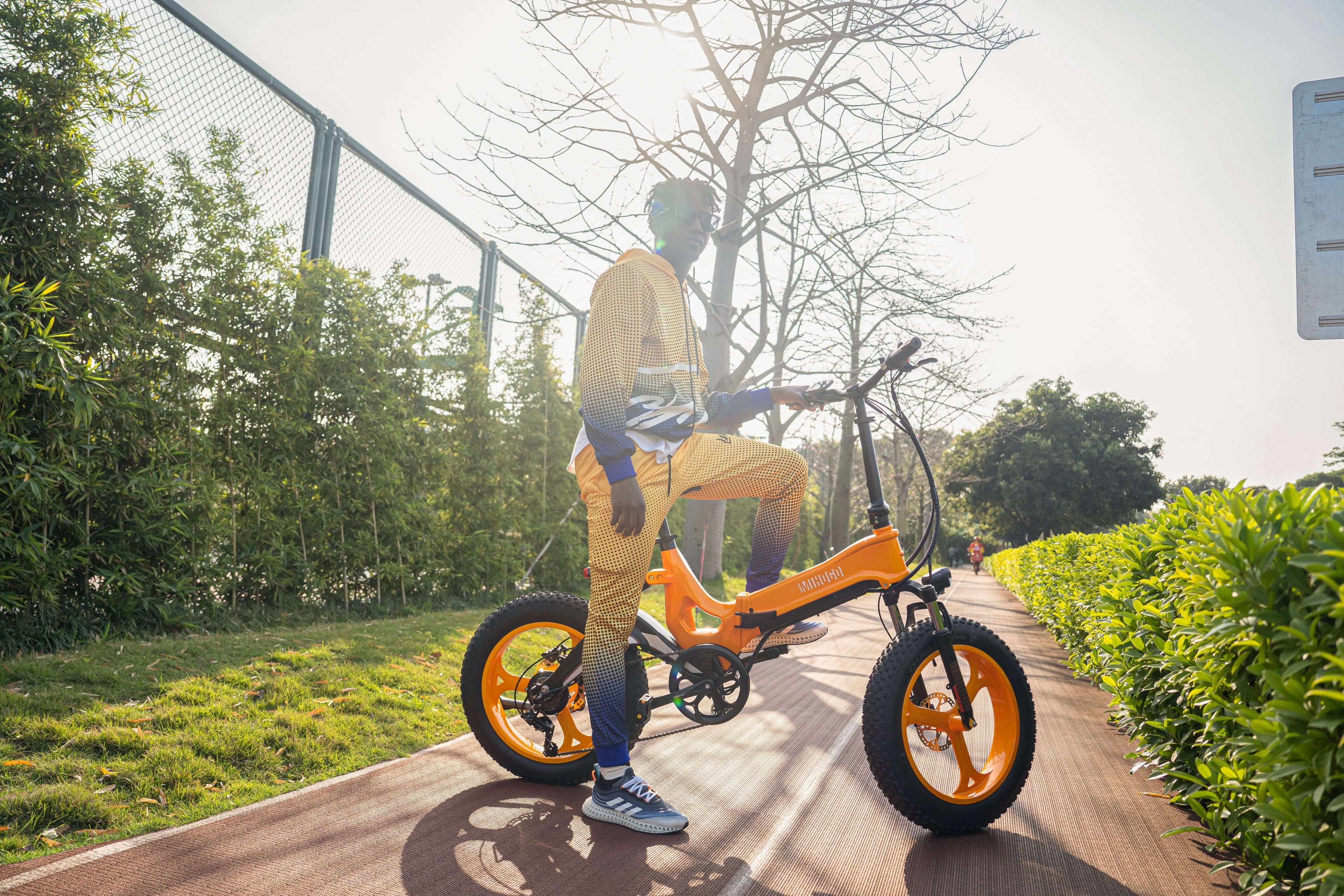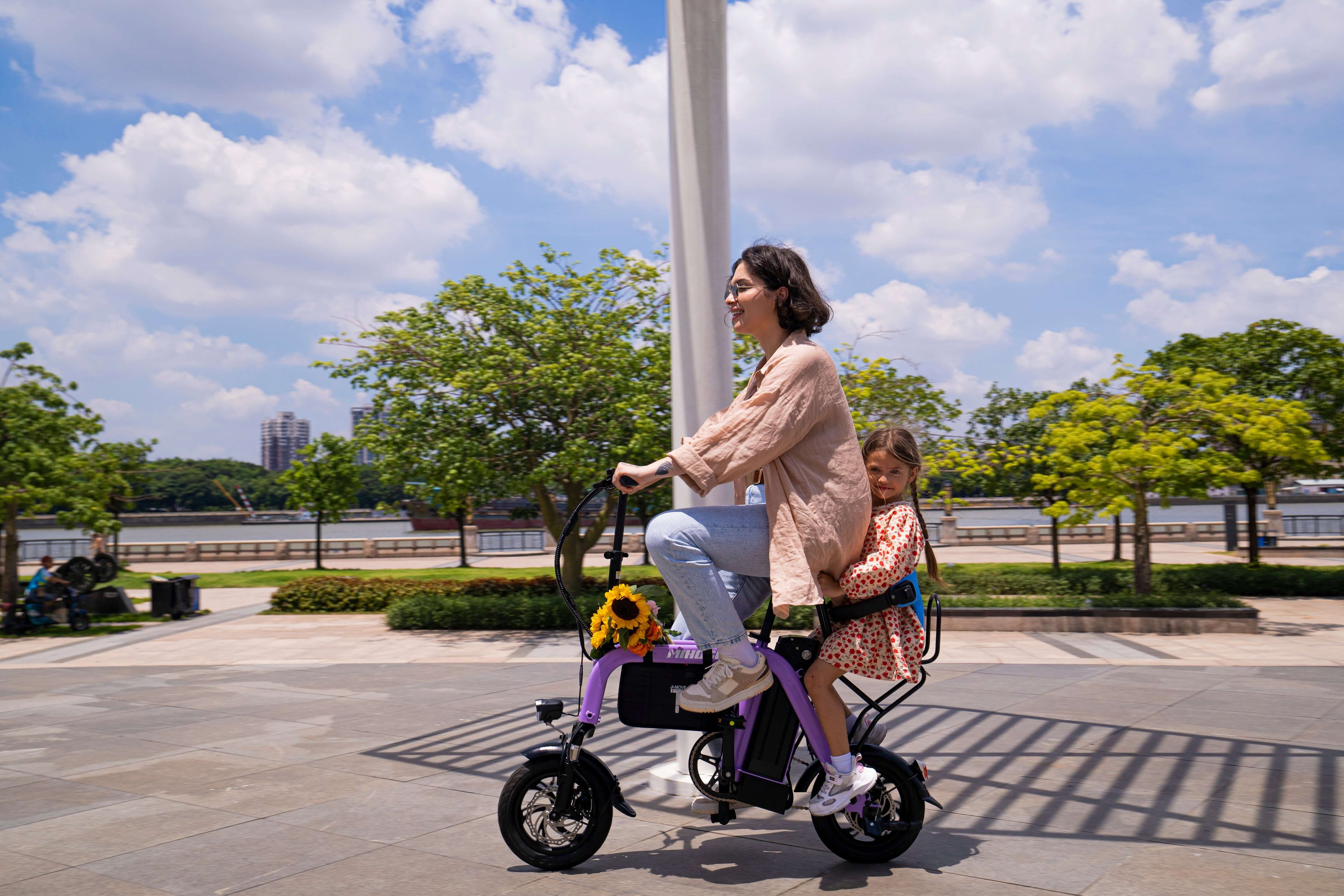Understanding Hill Grades and E-Bike Capabilities
Before tackling any incline, it's crucial to understand what your e-bike can handle. Most paved roads rarely exceed 10% grade, which translates to only about a 6-degree angle. Even roads that appear dramatically steep typically measure between 8-10% grade - well within the capabilities of modern e-bikes.
Key Hill Climbing Factors:
- Motor Power: Motors in the 500W-1000W range provide sufficient torque and power to tackle moderate to steep inclines
- Torque Output: Look for e-bikes with high torque (80-90 Nm) for sustained power on climbs
- Battery Capacity: Larger batteries ensure consistent power delivery throughout extended climbs
- Rider Weight: Total system weight affects climbing performance and energy consumption
Essential Safety Equipment for Hill Riding
Advanced Braking Systems
Hydraulic brakes deliver consistent stopping power that won't fade on long descents, making them essential for hill riding. Quality disc brakes provide reliable performance in all weather conditions, ensuring you can control your speed safely on steep descents.
Protective Gear
- MIPS Helmets: High-quality helmets with MIPS technology reduce rotational impact forces during falls
- Visibility Equipment: Light brightness becomes critical when climbing hills after sunset
- Weather-resistant gear: Essential for changing conditions on exposed hillsides
Battery Management
Ensure your battery has sufficient capacity for your planned route. A high-grade battery should handle up to 30 miles on a single charge for recreational riding with hills. Always carry your charger for longer excursions.
Mihogo Models: Terrain-Specific Recommendations
For Steep Urban Hills: Mihogo Air750 Max
Perfect for: City commuting with challenging gradients
- 750W motor with 900W peak power delivers excellent hill-climbing capability
- Dual 48V batteries (1386Wh total) provide 121-mile range for extended urban exploration
- Carbon fiber frame reduces overall weight while maintaining strength
- Dual torque sensors optimize power efficiency for battery conservation
For Mixed Terrain Adventures: Mihogo ONE Utility
Perfect for: Long-distance rides combining hills and flat terrain
- 750W motor with 85Nm torque handles steep inclines with authority
- 167-mile range eliminates range anxiety on extended hill climbs
- Puncture-proof tires ensure reliability on varied terrain
- Utility design accommodates cargo for touring or commuting
For Off-Road Hill Climbing: Mihogo NX Fat Tire
Perfect for: Challenging off-road trails and loose surfaces
- 750W motor peaking at 1000W provides maximum climbing power
- 4-inch fat tires deliver superior traction on loose or steep surfaces
- Full suspension maintains control and comfort on rough climbs
- 40-mile range suitable for most trail adventures
For Budget-Conscious Riders: Mihogo RX 2.4
Perfect for: Moderate hills and urban commuting
- 500W motor handles most city grades effectively
- Folding design enables easy transport and storage
- 40-mile range covers typical commuting distances
- Affordable entry point into hill-capable e-biking
For Compact Urban Riding: Mihogo Mini
Perfect for: Gentle hills and neighborhood riding
- 350W motor suitable for moderate inclines
- Compact design ideal for storage-conscious riders
- 62-mile range excellent for daily commuting needs
Advanced Hill Climbing Techniques
Pre-Climb Preparation
Battery Management: Start climbs with a full or near-full battery. Understanding gear shifting, battery management, and correct riding posture will help you tackle challenging climbs with confidence.
Route Planning: Study your route's elevation profile and identify rest stops for longer climbs.
Climbing Technique
Body Positioning: Weight distribution forward keeps your front wheel grounded while body positioning low maintains stability. Lean slightly forward to maintain traction on the front wheel while keeping your center of gravity low.
Pedal Assist Strategy: Use appropriate assist levels to maintain steady cadence. Pedal assist amplifies pedaling power for an easier ride while preserving battery life.
Gear Management: Shift to lower gears before the grade steepens. This maintains optimal motor RPM and prevents strain on the drivetrain.
Descent Safety
Speed Control: Use regenerative braking when available, and maintain steady pressure on brake levers rather than sudden stops.
Line Selection: Choose the smoothest line down hills, avoiding debris and maintaining a straight trajectory.
Motor Technology and Hill Performance
Mid-Drive vs. Hub Motors
Mid-drive motors work like a car engine with a gearbox, allowing you to change down gears so the motor spins faster as you pedal faster. This connection to the pedal cranks maintains power output even on steep grades.
Hub motors operate on one gear, meaning they're powerful on flat terrain and light inclines but less effective on steep hills.
Power Requirements
750W motor, 80Nm torque, and 48V battery represent the trinity for conquering any climb. These specifications ensure adequate power reserves for challenging terrain while maintaining reasonable efficiency.
Environmental Considerations
Weather Impact
- Rain: Reduces traction and braking effectiveness
- Wind: Headwinds increase energy consumption significantly
- Temperature: Cold weather reduces battery performance
Trail Conditions
Terrain conditions can influence the performance of e-bikes on hills. Loose surfaces, wet conditions, and debris all affect traction and safety.
Emergency Preparedness
Essential Tools
- Multi-tool with hex keys
- Tire repair kit
- Portable charger or backup battery
- First aid supplies
- Emergency communication device
Emergency Procedures
- Know your limits and turn back if conditions deteriorate
- Carry emergency contact information
- Inform others of your planned route and return time
Technology Integration for Safer Riding
Modern Mihogo e-bikes include advanced safety features:
- App connectivity for route planning and bike monitoring
- GPS tracking for navigation and security
- Bluetooth integration for hands-free communication
- Automatic battery switching (on dual-battery models) for uninterrupted power
Legal and Regulatory Considerations
E-bike laws are evolving in 2025, with some states discussing licensing requirements for higher-powered e-bikes. Stay informed about local regulations regarding:
- Maximum motor power limits
- Speed restrictions on trails
- Required safety equipment
- Insurance requirements
Maintenance for Hill Riding
Pre-Ride Inspection
- Check brake pad condition and cable tension
- Verify tire pressure and tread condition
- Test battery charge level and connections
- Inspect chain lubrication and tension
Post-Ride Care
- Clean brake rotors after muddy or dusty rides
- Charge batteries immediately after long climbs
- Inspect frame and components for stress damage
Advanced Safety Technologies
Some e-bike models feature vehicle-to-vehicle (V2V) communication, which allows e-bikes to communicate with nearby cars. This technology enhances safety by alerting drivers to e-bike presence in congested urban areas.
Conclusion
Hill climbing on e-bikes opens new possibilities for adventure and practical transportation, but success depends on proper preparation, appropriate equipment, and safe riding techniques. Whether you're tackling moderate slopes or extreme gradients, these e-bikes transform challenging climbs into conquerable adventures through superior engineering and thoughtful design.
Choose the right Mihogo model for your intended terrain, master the fundamental techniques, and prioritize safety equipment. With proper preparation and respect for the challenges involved, steep terrain becomes an opportunity for exhilarating and safe e-bike adventures.
Remember: the goal isn't just to reach the top - it's to arrive safely and enjoy the journey.







